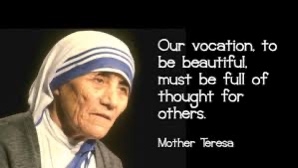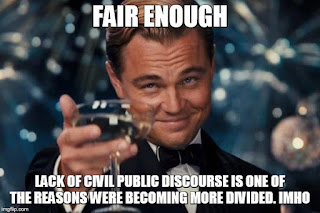Time Warp: Back to Ch.4 (aka I highly disagree with Johnathan Haidt)
Honestly so far in this book even including the subsequent chapters, I have found myself most disagreeing with what Johnathon Haidt says in both Ch.4 "Morality Binds and Blinds" and his TEDTalk. I will come out and say it is because I am a devout, practicing Catholic. I will agree however, that in a way having a moral code does bind you in the sense that when you as an individual depart from it you tend to feel hypocritical. Yes, when people latch on to some attitude toward morality that is fundamental is can blind them, but that is not the issue with morality itself, but rather with the person practicing it. I want to address a first what the book says (though the book mentions the TedTalk I will address that separately) or rather what Johnathan Haidt says in I'm Right and You're An Idiot.
While I understand that Hoggan summarizes what he probably heard from Haidt about Haidt's work I should point out that the generalizations of Liberal and Conservative seem to appear to make it look like Conservatism is a mindset someone should avoid despite Haidt's discussion of the yin-yang symbol. Also, to picture a conservative as someone who is almost the reverse of a liberal is somewhat unfair. I personally belief to say that conservatives do not celebrate diversity or question authority and speak for the weak and oppressed is unfair. For instance take Mother Theresa, an Albanian foundress of the Missionaries of Charity, a Catholic Order of nuns. She spoke for and ministered to the poor of Calcutta, India. When accepting her Nobel Peace Prize she said the prize was not going to her but to the poor, the people she served. It was her morality that drove her to do all that she did. She told Jesus in 1941 that she would do anything that he would ask. This promise came to the fore on September 10, 1946 when according to Mother Theresa herself experienced a "call within a call". This is what spurred the creation of the Missionaries of Charity Congregation (33 Days to a Morning Glory, 68). If it is true that morality blinds how should we interpret Mother Theresa's life?
Mother Theresa served the poor for most of her life and chose to see Christ in each person she met. This includes the homosexual. Johnathan's view that the reason that the reason why attitudes toward gay marriage changed because people got to know gay people is somewhat flawed. Yes perhaps everyone got to know gay or homosexual persons, but that doesn't necessarily mean their position on gay marriage changed. His example question that liberals asked "How does it hurt your marriage if other people marry? Don't they have the right?" ignores that many marriages result in children. So Gay marriage isn't just about the adults involved it also involves the definition of family. Not only that this question assumes that gay marriage has nothing to do with changing the idea and definition of marriage. The definition must express both the personal and interpersonal purposes for marriage. Now this may not be how everyone looks at marriage but in the Catholic Church to be valid a marriage must be "free", "total", "faithful", and "fruitful". Thus a marriage cannot be forced upon someone or arranged;A marriage must be exclusive and not involve either party seeking out other partners; finally, a marriage must at least be open to children produced through sexual intercourse, ideally. A homosexual union fails on the last point because it cannot naturally produce children and things such as in vitro fertilization are frowned upon by the Church. I once heard Jason Evert founder of the Chasity Project, tell as story about how Mother Theresa told some journalists to call "the gay men" in India "the Friends of Jesus". In terms of Catholic teaching this reflects that the most important identity and the defining identity of a person is his or her being made in the image and likeness of God. Now, this truth pertains to my major issue with one of the examples Haidt uses in his TEDTalk about the "Moral Roots of Liberals and Conservatives".
One's being created in the image and likeness of God not only should be their defining feature as a person, but also what makes them beautiful. According to the Catholic Church we should have a sense of wonder and awe when we look upon God's creation, thus we should be awed by the inherent beauty in what God has created. This is why I find it a bit off putting that Haidt uses the response to the statue of David by Michelangelo as an example of one who is liberal or conservative. The reaction he exemplifies as the "liberal reaction" one being intrigued by it could easily as be a conservative who subscribes to Christianity in some form (it doesn't have to be Catholicism). For Mother Theresa said the following (refer to image):
This shows that beauty and the development of beauty means being centered around others not ourselves. This is what Michelangelo did in creating the David statue he made himself beautiful by thinking of others though it may have been more unconscious than conscious. This Statue of David by Michelangelo surely was not meant to be a tool to differentiate between liberals and conservatives but to reflect the inherent beauty of the human body which we should all be amazed at. Michelangelo demonstrates in his creation of this statue the words of Saint John Paul the Great (Pope John Paul II [refer to image]):



I believe that because of globalization, a "standard" for behavior indeed no longer exists. For a while, I thought that was a bad thing, but I now believe that it allows us all to become our true selves. Discourse and disagreement is what allows a people to make change--look at many essential inventions such as the addictive cell phone--it became cordless because some people said "hey! this cord is really inconvenient" and disagreed with others, thus producing a new essential item.
ReplyDeleteI am a queer, nonbinary Catholic--a rare butterfly. I won't get into my personal beliefs, but does that make my version of Catholicism less truthful than yours? Not at all, because it is my personal truth, and as the texts have discussed, modern truth is subjective.
I believe that someone's morality can bind and blind them when it results in shut eyes and harm to others. If it's not harming others, then it's an acceptable morality, because one's own beliefs are their own choice. Now, if it's causing harm to others, say, take Hitler's genocide for example, then that's a very binding and blinding morality because he used it be make himself "holier than thou" and injured (and killed) others due to personal beliefs.
Additionally, my partner grew up in Vietnam and experienced a very different lifestyle than I. Therefore, there are certain behaviors he has that don't fit the **American** standard of behavior. He slurps everything he eats (it's respectful in Vietnam, but in America that's rude); he does not show PDA (again, not fitting the American standard), etc etc. But does that make him lesser than I? Not at all! He's just different! That's the beauty of an intercultural relation (of any kind)--you get to learn so much about other standards and become a more worldly person.
I think that it's ESSENTIAL to distinguish between one's own personal morality, and one's groupthink. If your personal beliefs don't harm others, they're fine--it's your choice. BUT, if your morality goes very against groupthink and discriminates and harms others in the process, (or if you can't gently set it aside enough to respect the other side of an issue!) that's more like the dangerous problem that Haidt is referencing.
I've always said, "believe whatever you'd like, but please coexist."
Sam,
DeleteCatholicism if accepted as the Truth cannot be subjective. It is an objective standard. Though some teachings may be difficult to understand and accept it is important to at least try to accept the teachings even those that are hard as truth. There is no subjective or designer Catholicism. Something is either Catholicism or it's not. There is not much gray area if there is any at all. While there is something called prudential judgement in matters such as how to deal with poverty teachings such as the True Presence of the Eucharist are to be expected in faith though one may not understand them.
This comment has been removed by the author.
ReplyDelete(lol messed up my initial comment)
DeleteWhile it's true that the entire world has differing ideas of moral standards, I do think some encompassing standards definitely exist and should. For example, it doesn't matter about your background or your beliefs, murder is wrong. It is a crime to murder an innocent and that's something I don't think anyone would argue. It is wrong to rape people. It is wrong to lie. It is wrong to abuse people. These are all very obvious examples, but I think they are necessary to show that there is a moral standard which should be upheld. Why are these crimes still considered so universally appalling if their is no global standard? Where do we draw a line if there is no standard? How can morals be determined without a standard if everyone can pick and choose what is right and wrong? What authority do you answer to if these morals are not upheld?
I also think that there is a difference between morals and etiquette. Etiquette will differ around the world and that's okay. We are all wonderfully different and unique people, so it's only natural that our customs and beliefs will differ. However, I think we can all agree that there are lines which must never cross when it comes to moral beliefs. Murdering innocents should always be wrong. Abusing others should always be wrong. There must be some standard of morality which we can all agree on to protect one another.